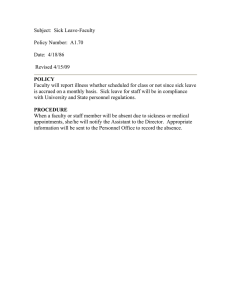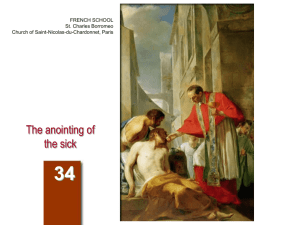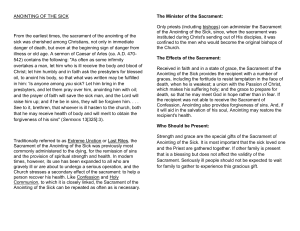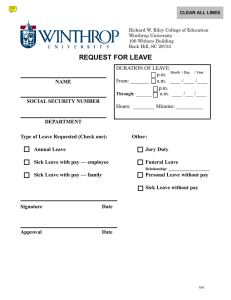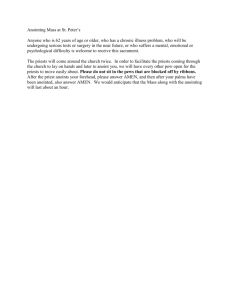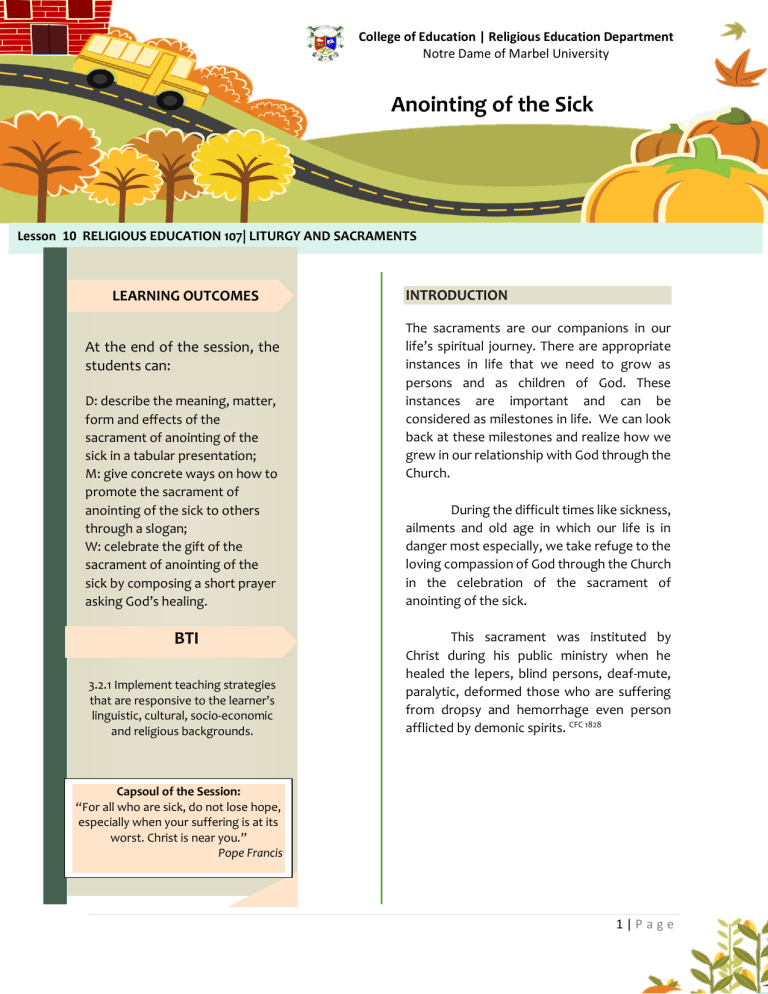
College of Education | Religious Education Department Notre Dame of Marbel University Anointing of the Sick Lesson 10 RELIGIOUS EDUCATION 107| LITURGY AND SACRAMENTS LEARNING OUTCOMES At the end of the session, the students can: D: describe the meaning, matter, form and effects of the sacrament of anointing of the sick in a tabular presentation; M: give concrete ways on how to promote the sacrament of anointing of the sick to others through a slogan; W: celebrate the gift of the sacrament of anointing of the sick by composing a short prayer asking God’s healing. BTI 3.2.1 Implement teaching strategies that are responsive to the learner’s linguistic, cultural, socio-economic and religious backgrounds. INTRODUCTION The sacraments are our companions in our life’s spiritual journey. There are appropriate instances in life that we need to grow as persons and as children of God. These instances are important and can be considered as milestones in life. We can look back at these milestones and realize how we grew in our relationship with God through the Church. During the difficult times like sickness, ailments and old age in which our life is in danger most especially, we take refuge to the loving compassion of God through the Church in the celebration of the sacrament of anointing of the sick. This sacrament was instituted by Christ during his public ministry when he healed the lepers, blind persons, deaf-mute, paralytic, deformed those who are suffering from dropsy and hemorrhage even person afflicted by demonic spirits. CFC 1828 Capsoul of the Session: “For all who are sick, do not lose hope, especially when your suffering is at its worst. Christ is near you.” Pope Francis 1|P age Activity: Recall your experiences 0f being sick and visiting the sick and answer the following questions: 1. How do you feel being sick? 2. Why do we visit those who are sick? 3. What is the message conveyed to us when someone is sick? ACQUISITION OF NEW KNOWLEDGE (CFC 1822-1841) Meaning “The Catholic Sacrament of Anointing of the Sick, formerly known as Last Rites or Extreme Unction, is a ritual of healing appropriate not only for physical but also for mental and spiritual sickness. The Sacrament of Anointing is healing in a special sense: it brings Christ’s compassionate loving healing to bear on those suffering serious sickness (cf. CCC 1499). By “healing” we do not necessarily mean a cure or the eradication of the disease or defect, which the medical profession pursues. While some diseases and evils may be “incurable” in the medical sense, there can be “healing” by holistic care that touches the body, soul and spirit of the sick person (cf. 1 Thes 5:23). Healing, then, means the process by which persons are helped to realize their full potential before God and their fellow men and women. The Good News is primarily about healing, not “cure” in the current medical sense. Recipient Any member of the faithful can receive this sacrament as soon as he or she begins to be in danger of death because of sickness or old age. The faithful who receive this sacrament can receive it several times if their illness becomes worse or another serious sickness afflicts them. The celebration of this sacrament should, if possible, be preceded by individual confession on the part of the sick person.” (http://stgeorgeaj.com/anointing). Minister The minister of the sacrament of anointing of the sick is the bishop or the priest. Let’s compare the meaning of healing and cure for better clarity of this sacrament. Cure refers to “eradication of disease or defect which the medical profession pursues. While healing is a holistic care that touches the body, soul and spirit of the sick person. Healing means the process by which sick persons are helped realized their full potential before God and their fellow men and women.” CFC 1822 Why is there a need for healing after all? It is due to the presence of sickness. What is sickness? Well, it is personal experience of unhealthy condition of body and/or mind or any form of illness. Serious illness brings out our powerlessness and radical limitations. We can no longer function well 2|P age when we are seriously ill. We become dependent on others, feel useless and isolated from them and from the community. We become worried, anxious and worse…depressed. CFC 1823 On the other hand, sickness can bring us to a more mature faith, helping us to discern what is really important in our life. As Christians, our faith helps us to understand better the mystery of suffering and to bear the pain more bravely. CFC 1824 Sickness We have all experienced sickness at some time in our lives (cf. CCC 1500-1). Serious illness brings out our powerlessness and radical limitations as nothing else does. When in good health, we are active, feel useful and needed by others, a real part of the community. But when serious sickness strikes us, we can no longer act as we would. We become completely dependent on others, feel useless and isolated from them and from the community. Worry and anxiety begin to depress us, and sometimes even tempt our Christian Faith. “Why did God send me this sickness? What did I do to deserve this?” Sickness can bring us to a more mature Faith, helping us to discern what is really important in our life, against all the superficial, passing attractions that so often dominate us. As Christians, our Faith helps us to understand better the mystery of suffering and to bear pain more bravely. From Christ’s words we know that sickness has meaning and value for our own salvation and for others. We also know how Christ loved the sick, and often healed them of their infirmities (cf. IRA 1). Celebration of the Sacrament The celebration of the sacrament of anointing of the sick starts with initial greeting, and recommend Penitential Rite similar to the one used in the Mass, the Sacrament consists of three distinct actions. First, the prayer of faith in which the community, the lay people of God represented by the priest, the family, friends and others, pray for those to be anointed. Second, the laying on of hands imitating Jesus’ own gesture of healing and invoking the coming of the Holy Spirit who brings the blessing of God’s healing grace upon the sick person. Third, anointing with oil made holy by God’s blessing, signifying the strengthening and healing that comes from the Spirit. Anointing the forehead and hands of the sick, the priest prays: “Through this holy anointing may the Lord, in His love and mercy, help you with the grace of the Holy Spirit. Amen. May the Lord who frees you from sin save you and raise you up. Amen.” CFC 1836 Effects of the Sacrament The new rite describes the Sacrament of Anointing as providing the sick person with the grace of the Holy Spirit by which the whole person is brought to health, trust in God is encouraged, and strength is given to resist the temptations of the Evil One, and anxiety about death. Sometimes even physical health is restored after receiving the Sacrament if it will be beneficial to the sick person’s salvation. When needed, the sacrament also offers the sick person forgiveness of sins and completes the salutary penance. These effects are brought about by uniting the sick person with the Passion and Death of the Primordial Sacrament, Christ, the Healer. Thus the sacrament transforms the meaning and significance of the sick person’s illness into a sharing in the saving work of Jesus, the Redeemer, filling up what is 3|P age lacking in the sufferings of Christ for the sake of his body, the Church (cf. Col 1:24) and for the salvation of the world as we look forward to all creation being set free in the glory of the children of God (cf. CCC 1521). This union with Christ is an ecclesial grace, since the Church both intercedes for the sick person, and is in turn blessed by the sick person’s self-offering in faith. Thus the Church exercises its role as Foundational Sacrament in this Sacrament of Anointing (cf. CCC 1522). The Matter of the Sacrament The matter of this sacrament is anointing with the Holy Oil upon the sick person’s head and hands. The form is “Through this holy anointing may the Lord in his love and mercy help you with the grace of the Holy Spirit. May the Lord who frees you from sin, save you, and raise you up.” (https://media.ascensionpress.com) PASTORAL CARE OF THE DYING/DECEASED A. Holy Viaticum The revised ritual’s “Pastoral Care of the Dying” describes how the Church cares for, comforts, and strengthens the dying Catholic in the passage from this life (cf. CCC 1524). This ministry to the dying which includes both anointing and the reception of the Eucharist as Viaticum, stresses trust in the Lord’s promise of eternal life: “He who feeds on my flesh and drinks my blood, has life eternal, and I will raise him up on the last day” (Jn 6:54). The Eucharist as Viaticum completes and crowns our Christian life on earth. It vividly portrays Christ as leading and accompanying the Christian into eternal glory and the banquet of the heavenly Kingdom with all the saints and the blessed united together in the Holy Spirit before the Father. As the Sacraments of Baptism, Confirmation and Eucharist constitute the unity of the “Sacraments of Initiation,” so Penance, Anointing and Viaticum constitute the Sacraments “which complete our journey”. CCC 1525 The Eucharist as Viaticum completes and crowns our Christian life on earth. It vividly portrays Christ as leading and accompanying the Christian into eternal glory and the banquet of the heavenly Kingdom with all the saints and the blessed united together in the Holy Spirit before the Father. As the Sacraments of Baptism, Confirmation and Eucharist constitute the unity of the “Sacraments of Initiation,” so Penance, Anointing and Viaticum constitute the Sacraments “which complete our journey” CCC 1525 B. Rite of Funerals We Filipinos are noted for the many family and cultural customs relating to death in the family. The revised “Rite for Funerals,” while commending the dead to God, supporting the Christian hope of the people and witnessing to faith in the resurrection of the baptized with Christ, stresses just such customs. It advises Christians to seriously consider the “feeling and practice of their own time and place __ family traditions, and local customs”. Contrary to some “modern” secularist tendencies in western society to cover up the “grieving process” and eliminate all funeral rites, Filipinos are very much attuned to the specifically Christian meanings of funeral rites. 4|P age The new rite helpfully proposes the most significant meanings of Christian funeral rites: God is worshipped, the Paschal nature of the Christian’s death is proclaimed, and Christian hope of reunion in the Kingdom of God is strengthened (cf. 2 Cor 5:8; CCC 1681-83). Thanks and respect are given for the life of the deceased; intercession is made for God’s mercy on the deceased; and the bereaved family and friends are offered the consolation of faith in their very sorrow and grief. In brief, through the Church ritual we pray for the dead, profess our faith in eternal life, and receive hope and consolation in the liturgy while expressing our sorrowful farewell to our beloved dead. APPLICATION Complete the table below by providing what is asked in the chart. Meaning Matter Form Effects Compose a short prayer asking God’s healing especially to those who are in need of healing. ____________________________________________________________________________________ ____________________________________________________________________________________ ____________________________________________________________________________________ ____________________________________________________________________________________ ____________________________________________________________________________________ ____________________________________________________________________________________ ____________________________________________________________________________________ ____________________________________________________________________________________ ____________________________________________________________________________________ _________________________________ 5|P age ASSESSMENT Slogan Making Create a slogan that will help promote the sacrament of anointing of the sick. Post your slogan in your Facebook account. Criteria: Creativity – 30% Relevance to the theme – 40% Quality of work – 30% REFERENCES http://stgeorgeaj.com/anointing https://media.ascensionpress.com/2018/07/05/form-and-matter-in-the-sacraments-continued/ Catechism for Filipino Catholics: Catholic Bishops Conference of the Philippines. (1997). Manila, Philippines: ECCCE World and Life Publications. 6|P age
